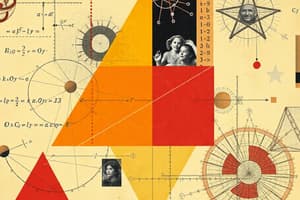Podcast
Questions and Answers
Match the fields of mathematics with their descriptions:
Match the fields of mathematics with their descriptions:
Arithmetic = Study of shapes, sizes, and properties of space Algebra = Involves symbols and rules for manipulating those symbols Geometry = Study of uncertainty and the likelihood of events occurring Statistics = Involves the collection, analysis, interpretation, presentation, and organization of data
Match the key concepts with their definitions:
Match the key concepts with their definitions:
Numbers = Mathematical statements asserting the equality of two expressions Functions = Relationships between sets of numbers Equations = Propositions that have been proven based on previously established statements Theorems = Includes natural numbers, whole numbers, integers, rational numbers, and real numbers
Match the applications of mathematics with their respective fields:
Match the applications of mathematics with their respective fields:
Engineering = Statistical analysis in research and development Economics = Modeling and analyzing market behavior and trends Computer Science = Designing structures, systems, and technologies Medicine = Algorithms, data structures, and cryptography
Match the historical figures with their contributions:
Match the historical figures with their contributions:
Match the fields of mathematics with their focuses:
Match the fields of mathematics with their focuses:
Match the study tips with their purposes:
Match the study tips with their purposes:
Match the types of numbers with their definitions:
Match the types of numbers with their definitions:
Match the types of equations with their examples:
Match the types of equations with their examples:
Flashcards are hidden until you start studying
Study Notes
Definition
- Mathematics is the abstract science of number, quantity, and space, either as abstract concepts (pure mathematics), or as applied to other disciplines such as physics and engineering (applied mathematics).
Fields of Mathematics
- Arithmetic: Study of numbers and basic operations (addition, subtraction, multiplication, division).
- Algebra: Involves symbols and rules for manipulating those symbols; focuses on solving equations.
- Geometry: Study of shapes, sizes, and properties of space; includes the study of points, lines, angles, surfaces, and solids.
- Trigonometry: Focuses on the relationships between the angles and sides of triangles.
- Calculus: Study of change and motion; includes differentiation and integration.
- Statistics: Involves the collection, analysis, interpretation, presentation, and organization of data.
- Probability: Study of uncertainty and the likelihood of events occurring.
- Discrete Mathematics: Studies mathematical structures that are fundamentally discrete rather than continuous; includes graph theory and combinatorics.
Key Concepts
- Numbers: Includes natural numbers, whole numbers, integers, rational numbers, and real numbers.
- Functions: Relationships between sets of numbers; can be linear, quadratic, exponential, etc.
- Equations: Mathematical statements asserting the equality of two expressions; solutions can be found using various methods.
- Theorems: Propositions that have been proven based on previously established statements and axioms.
Importance
- Shapes logical reasoning and critical thinking skills.
- Foundation for sciences, engineering, economics, and technology.
- Useful in everyday decision-making and problem-solving.
Applications
- Engineering: Designing structures, systems, and technologies.
- Economics: Modeling and analyzing market behavior and trends.
- Computer Science: Algorithms, data structures, and cryptography.
- Medicine: Statistical analysis in research and development.
Historical Figures
- Euclid: Known as the "Father of Geometry."
- Isaac Newton: Co-developer of calculus.
- Carl Friedrich Gauss: Made significant contributions to number theory and statistics.
- Leonhard Euler: Made important discoveries in calculus, graph theory, and topology.
Study Tips
- Practice regularly to strengthen understanding.
- Break down complex problems into smaller parts.
- Utilize visual aids (graphs, diagrams) to grasp concepts.
- Collaborate with peers for different perspectives and problem-solving methods.
Definition of Mathematics
- Abstract science encompassing number, quantity, and space.
- Divided into pure mathematics (theoretical concepts) and applied mathematics (real-world applications).
Fields of Mathematics
- Arithmetic: Fundamental operations—addition, subtraction, multiplication, division.
- Algebra: Utilizes symbols to solve equations and manipulate expressions.
- Geometry: Examines properties of shapes and space, focusing on points, lines, angles, surfaces, and solids.
- Trigonometry: Analyzes relationships among angles and sides of triangles.
- Calculus: Investigates change and motion through differentiation and integration.
- Statistics: Involves collecting, analyzing, interpreting, and presenting data.
- Probability: Explores uncertainties and the chances of various events occurring.
- Discrete Mathematics: Studies distinct mathematical structures, including graph theory and combinatorics.
Key Concepts
- Numbers: Includes various categories like natural, whole, integers, rational, and real numbers.
- Functions: Describes relationships between number sets; types include linear, quadratic, and exponential functions.
- Equations: Formulas that state equality between two expressions; solutions approach varies.
- Theorems: Verified propositions derived from established statements and axioms.
Importance of Mathematics
- Enhances logical reasoning and critical thinking.
- Serves as a foundational element in sciences, engineering, economics, and technology.
- Aids in effective decision-making and problem-solving in everyday life.
Applications of Mathematics
- Engineering: Involved in the design of structures and technologies.
- Economics: Utilizes mathematical modeling to analyze market behavior.
- Computer Science: Integral in developing algorithms and data structures and in cryptography.
- Medicine: Employs statistical analysis for research and development purposes.
Historical Figures in Mathematics
- Euclid: Renowned as the "Father of Geometry" for his foundational work.
- Isaac Newton: Co-developed calculus, shaping modern mathematics.
- Carl Friedrich Gauss: Significant contributions to number theory and statistics.
- Leonhard Euler: Influential in fields such as calculus, graph theory, and topology.
Study Tips for Mathematics
- Engage in regular practice to solidify comprehension.
- Decompose complex problems into manageable components.
- Utilize visual tools like graphs and diagrams to clarify concepts.
- Collaborate and discuss with peers to explore diverse problem-solving approaches.
Studying That Suits You
Use AI to generate personalized quizzes and flashcards to suit your learning preferences.




